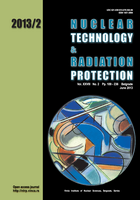
RADIATION-MEDIATED INDUCTION OF APOPTOTIC CELL DEATH IN RAT HIPPOCAMPUS

Vol.
XXVIII, No. 2, Pp. 109-236
June 2013
UDC 621.039+614.876:504.06
ISSN 1451-3994
Pages: 212-220
Authors: Nataša A. Veličković, Ana D. Djordjević, Dunja R. Drakulić, Bojana Lj. Šećerov, Ivana S. Grković, Maja S. Milošević, and Anica I. Horvat
Abstract
Ionizing radiation is commonly used in the treatment of brain tumors but it can impair cognitive functions, such as learning and memory. Since cognitive dysfunctions are predominantly result of cell death by apoptosis in hippocampal cells, in this study we analyzed acute effects of cranial gamma-irradiation (10 Gy) on expression of proapoptotic molecules (p53, Bax) and antiapoptotic molecule Bcl-2, as well as caspase-3 activation and cytochrome c redistribution in the hippocampus of young rats. The selected regimen of irradiation resembles the established animal model for childhood prophylactic cranial radiotherapy. Our results demonstrated that p53 mRNA expression was unchanged after irradiation, while induction of p53 protein was rapid. In parallel, Bax mRNA and protein levels were also increased following irradiation, whereas Bcl-2 expression was not changed during the examined post-irradiation period. These changes were accompanied with early hallmarks of apoptosis, such as increased cytochrome c release and stimulated activation of caspase-3. Overall, this study demonstrates that cranial irradiation is associated with the augmented apoptotic pathway in the rat hippocampus, which could be related to the cognitive decline observed in patients after prophylactic cranial radiotherapy, but also opens perspective in finding radioprotectors that can mitigate radiation injury of normal brain tissue.
Key words: cranial irradiation, apoptosis, hippocampus, rat
FULL PAPER IN PDF FORMAT (595 KB)